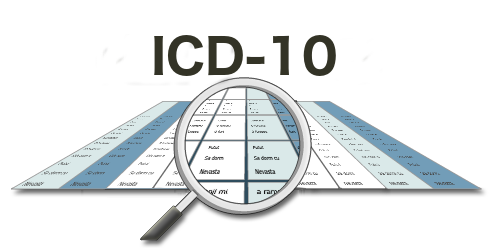"ICD-10 AnalystTM Certification Holder Exam" recognized by widely known coding organizations like the American Academy of Professional Coders (AAPC) or the American Health Information Management Association (AHIMA). It's possible that there might be specialized certifications or exams offered by specific organizations or training providers, but I do not have information on any "ICD-10 AnalystTM" certification as of my last update.

Certifications related to medical coding typically focus on broader coding systems like ICD-10, CPT, and HCPCS, rather than a specific "ICD-10 AnalystTM" certification. These certifications assess a coder's knowledge and proficiency in assigning accurate codes for diagnoses and procedures based on medical documentation.
If there is a specific "ICD-10 AnalystTM" certification exam or program you are interested in, I recommend researching the certifying organization or training provider to ensure its legitimacy and reputation within the coding industry. Look for reviews and testimonials from other certified professionals who have completed the program, and verify the credentials and affiliations of the organization offering the certification.
2. CPC Exam
Comprehensive Medical coding Training with CPC preparation
- • Includes 5 sample CPC Papers + 5 Mock exams+ Slot booking
- • Excellent opportunity for Hyderabad coders and billers
- • Professional approach to pass the exam
- •Take CPC exam with low cost.
- • NO EXTRA FEES for slot booking.
Training Heighlits:
Highly Experienced Faculty
Training Material provided
Study whenever and wherever you want
Continue to work while gaining knowledge to climb the ladder of success in your career
Achieve your goals without sacrificing your job
Become fully trained in 2 months.
Contact Details:
For more info. Please contact us:
Phone: +91 9625580114
Address: Altf Grovy Optiva, MR1, A5Block-A ,Grovy Optiva,
Sector-68, Noida UttarPradesh- 201301
#217, Annapurna Block, Aditya Enclave, Ameerpet, Hyderabad – 500016
Email: info@jabiintelligents.com
The CPC‘s abilities include:
Expert in reviewing and assigning accurate medical codes for diagnosis, procedures, and services performed by physicians and other qualified health care providers. Proficiency across a wide range of services, including evaluation and management, anesthesia, surgical services, radiology, pathology and medicine.
The CPC Exam (physician practice):
150 multiple choice questions (proctored)
5 hours and 40 minutes to finish the exam
1 free retake
Open code book (manuals)
$500.00+ AAPC Member ship ($125)
3. CCS Exam
AHIMA CCS/CCA Examination

The AHIMA CCS (Certified Coding Specialist) and CCA (Certified Coding Associate) examinations are two well-known certifications offered by the American Health Information Management Association (AHIMA). These certifications focus on medical coding and are designed to validate a coder's knowledge and skills in assigning accurate codes for diagnoses and procedures based on medical documentation.
Certified Coding Specialist (CCS):
The CCS certification is geared towards experienced coders who specialize in inpatient coding. It demonstrates a coder's expertise in assigning ICD-10-CM and ICD-10-PCS codes for diagnoses and procedures performed in the inpatient setting, such as hospitals or other healthcare facilities. The CCS exam tests candidates' proficiency in complex coding scenarios, knowledge of medical terminology, pharmacology, and reimbursement methodologies.
Certified Coding Associate (CCA):
The CCA certification is an entry-level certification intended for individuals who are new to the coding field or have limited coding experience. It covers the basics of coding, including ICD-10-CM and CPT coding, and assesses candidates' understanding of coding guidelines and medical terminology.
4.What is HIPAA
HIPAA, the Health Insurance Portability and Accountability Act,

HIPAA was enacted by the U.S. Congress in 1996, and became effective July 1, 1997. This act is a grouping of regulations that work to combat waste, fraud, and abuse in health care delivery and health insurance. The intention of the HIPAA is also to improve the effectiveness and efficiency of the health care system, portability and continuity of health insurance coverage in the group and individual markets, as well as the ability to provide consequences to those that do not apply with the regulations explicitly stated within the Act.
The HIPAA Privacy Rule creates national standards to protect individuals’ medical records and other personal health information.
It gives patients more control over their health information.
It sets boundaries on the use and release of health records.
It establishes appropriate safeguards that health care providers and others must achieve to protect the privacy of health information.
It establishes appropriate safeguards that health care providers and others must achieve to protect the privacy of health information.
And it strikes a balance when public responsibility supports disclosure of some forms of data for example, to protect public health.
For patients
It means being able to make informed choices when seeking care and reimbursement for care based on how personal health information may be used.
It enables patients to find out how their information may be used, and about certain disclosures of their information that have been made.
It generally limits release of information to the minimum reasonably needed for the purpose of the disclosure.
It generally gives patients the right to examine and obtain a copy of their own health records and request corrections.
It empowers individuals to control certain uses and disclosures of their health information.
The HIPAA Code Set Regulations establish a uniform standard of data elements used to document reasons why patients are seen and the procedures performed during health care encounters. HIPAA specified code sets to be used are:
1. Diagnoses – ICD 9
2. Procedures – CPT 4, CDT
3. Supplies/Devices – HCPCS
4.Additional Clinical Data – Health Level Seven (HL7)
HIPAA titles
HIPAA is a legislative act made up of five titles as described below:
Title I
“Health care access, portability and renewability,” employers and health plans must allow a new employee’s medical insurance coverage to remain continuous without regard to pre-existing conditions.
Title II
Preventing health care fraud and abuse; administrative simplification; medical liability reform” defines new requirements for privacy and security of individually identifiable patient information.
Title III
“Tax-related health provisions” standardizes the amount you can save per person in a pre-tax medical savings account.
Title IV
“Application and enforcement of group health plan requirements” broadened information on insurance reform provisions and provide detailed explanations.
HIPAA Benefits
- • Lowering administrative costs
- •Improved efficiency for patients and providers
- • Increasing customer satisfaction
- •Improved security and privacy of information
- • Penalties for Failure to Comply with HIPAA
- The legislation carries heavy civil and criminal penalties for failure to comply. US DHHS Office for Civil Rights will enforce civil penalties that may include penalties from $100 per violation to $25,000 per calendar year. US Department of Justice will enforce criminal penalties which may include up to 10 years imprisonment and a $250,000 fine.
